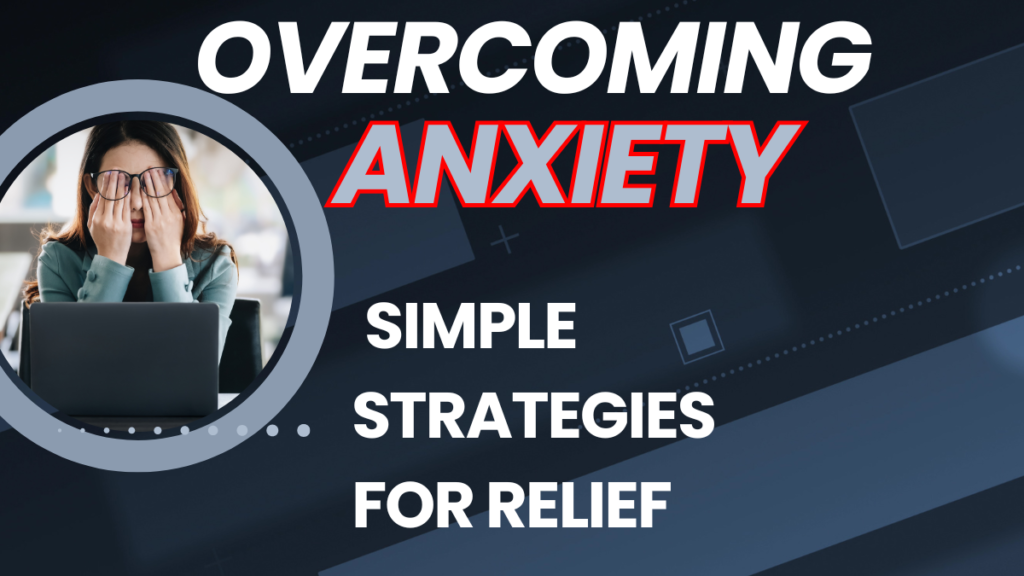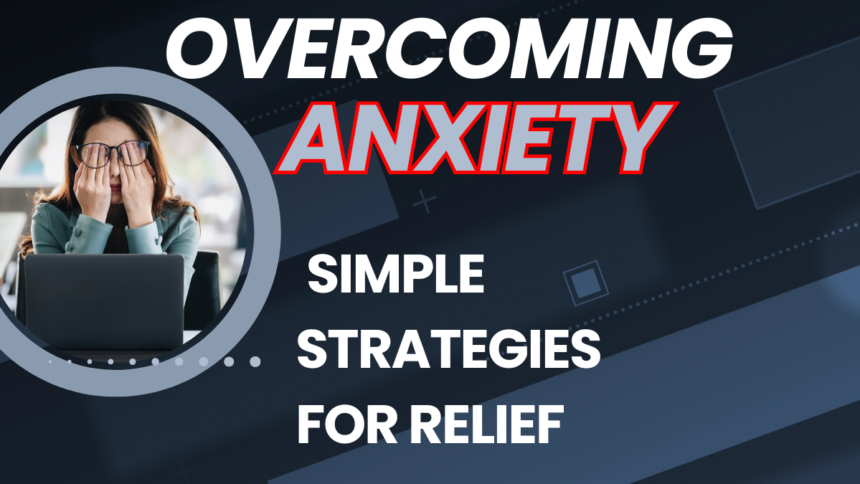Overcoming Anxiety
In this post, we’ll explore practical, human-centered ways to manage anxiety. These tips aren’t about quick fixes or unrealistic expectations—they’re about small, actionable steps you can take to regain control and feel more like yourself again. Let’s dive in.

Understanding Anxiety: What’s Really Going On?
Before we talk about overcoming anxiety, it’s important to understand what it is. Anxiety is your body’s natural response to stress. It’s that “fight or flight” instinct kicking in, even when there’s no immediate danger. While a little anxiety can be helpful (like keeping you alert before a big presentation), too much of it can interfere with your daily life.
Common symptoms of anxiety include:
- Persistent worry or fear
- Restlessness or feeling on edge
- Difficulty concentrating
- Fatigue
- Irritability
- Muscle tension
- Sleep problems
If any of these sound familiar, know that you’re not broken—you’re human. And the strategies below can help you feel better.
1. Breathe Your Way to Calm
When anxiety strikes, your breathing often becomes shallow and rapid, which can make things feel worse. One of the simplest and most effective ways to calm your mind is to focus on your breath.
Try this:
- Sit or lie down in a comfortable position.
- Close your eyes and take a slow, deep breath in through your nose for a count of four.
- Hold your breath for a count of four.
- Exhale slowly through your mouth for a count of six.
- Repeat this cycle for a few minutes.
This technique, known as diaphragmatic breathing or “box breathing,” helps activate your body’s relaxation response. It’s like hitting a reset button for your nervous system.
Video Credits
2. Ground Yourself in the Present Moment
Anxiety often pulls us into the future, where we worry about things that haven’t even happened yet. Grounding techniques can help bring you back to the present moment, where things are usually more manageable.
One popular method is the 5-4-3-2-1 technique:
- Look around and name 5 things you can see.
- Identify 4 things you can touch.
- Notice 3 things you can hear.
- Find 2 things you can smell.
- Acknowledge 1 thing you can taste.
This exercise engages your senses and helps break the cycle of anxious thoughts.
3. Move Your Body (Yes, Really)
Exercise isn’t just good for your physical health—it’s a powerful tool for managing anxiety. Physical activity releases endorphins, those feel-good chemicals that boost your mood and reduce stress.
You don’t need to run a marathon or lift heavy weights to reap the benefits. Even a 10-minute walk around the block, a gentle yoga session, or dancing to your favorite song can make a difference. The key is to find something you enjoy and make it a regular part of your routine.
4. Challenge Your Anxious Thoughts
Anxiety often feeds on irrational or exaggerated thoughts. For example, you might think, “If I don’t get this project perfect, I’ll lose my job.” But is that really true? Probably not.
Cognitive-behavioral techniques can help you challenge these thoughts. Ask yourself:
- Is this thought based on facts or assumptions?
- What’s the worst that could happen, and how likely is it?
- What’s a more balanced way to look at this situation?
By questioning your anxious thoughts, you can start to see them for what they are—just thoughts, not facts.
5. Create a Worry Window
It’s easy to get caught up in endless worrying, but setting aside a specific time to address your concerns can help. Try this:
- Choose a 15- to 20-minute window each day (not too close to bedtime) as your “worry time.”
- During this time, write down everything that’s bothering you.
- When the time is up, close your notebook and move on with your day.
This technique helps contain your worries so they don’t take over your entire day.
6. Prioritize Self-Care
Self-care isn’t selfish—it’s essential. When you’re feeling anxious, it’s easy to neglect your basic needs, but taking care of yourself can make a big difference.
Here are a few self-care practices to consider:
- Get enough sleep (aim for 7-9 hours a night).
- Eat balanced meals to keep your energy stable.
- Spend time doing things you enjoy, whether it’s reading, painting, or gardening.
- Connect with loved ones who make you feel supported.
Remember, self-care looks different for everyone. The goal is to do what feels nourishing and restorative for you.
7. Seek Professional Help When Needed
While these strategies can be incredibly helpful, there’s no shame in seeking professional support. Therapists, counselors, and psychiatrists are trained to help you navigate anxiety and develop personalized coping strategies.
Cognitive-behavioral therapy (CBT), mindfulness-based therapies, and medication are just a few of the options that might be recommended. If you’re unsure where to start, consider reaching out to your primary care doctor or a mental health professional.
Conclusion: Small Steps, Big Changes
Overcoming anxiety isn’t about eliminating it entirely—it’s about learning to manage it so it doesn’t control your life. By incorporating these simple strategies into your daily routine, you can start to feel more grounded, calm, and in control.
Remember, progress takes time, and it’s okay to have setbacks along the way. Be kind to yourself, celebrate small victories, and don’t hesitate to reach out for support when you need it.
If you found this post helpful, I’d love to hear from you. Share your thoughts in the comments below, or pass this along to someone who might benefit from it. Together, we can create a community of support and understanding.











